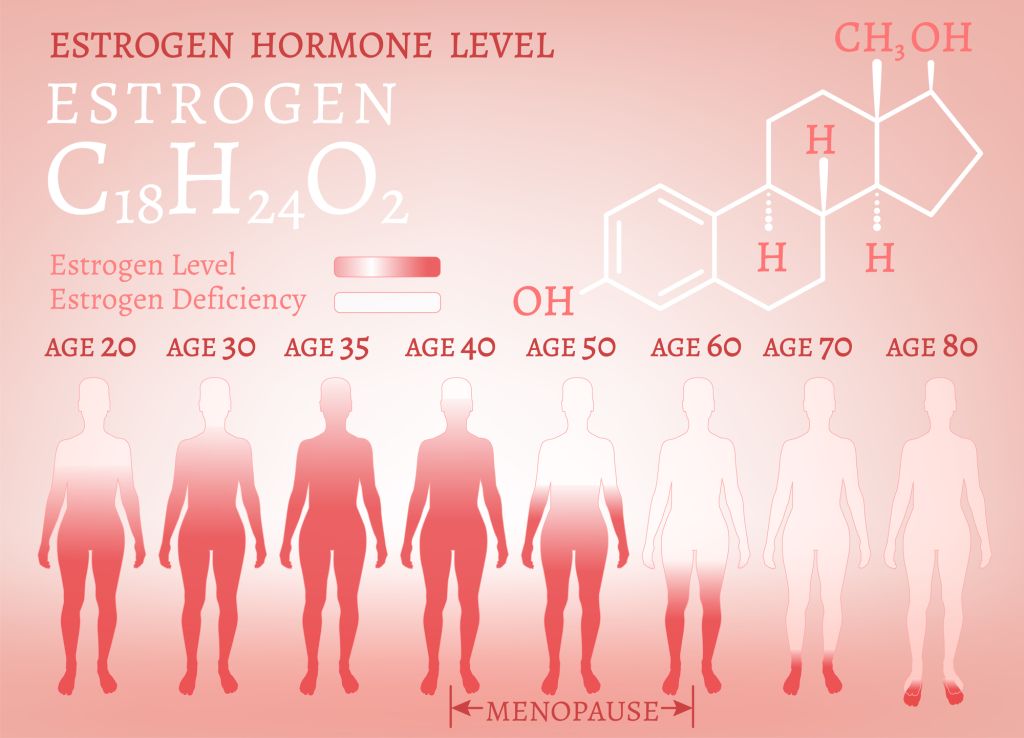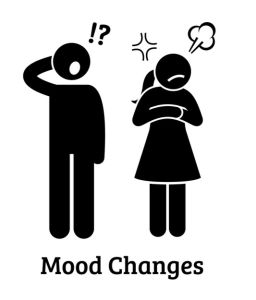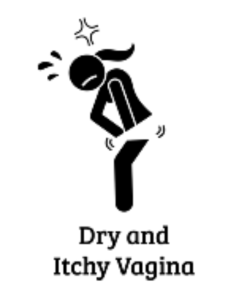- in Health , Menopause , Women Health by tony
Weight gain and perimenopause

Estrogen is also known as female sex hormone, but is present in both males and females, although this hormone is more abundant in women.
Perhaps the most popular among all hormones, it refers to a cluster of hormones with the same chemical makeup and they have a significant impact on the organs, cells, and the overall growth and functioning of the human body.
More...
How Estrogen Helps for a Healthy Function
These hormones are formed not only in the ovaries, but also in adrenal glands and fat tissues. In the rest of this article, you will know more about the different functions of estrogen in the human body, and hence, providing you with a better understanding on how it is essential to one’s health.
Physical Development of the Body
One of the most widely researched effects of estrogen on women’s health deals with how they have an impact on physical appearance. This is comparable to the way by which testosterone works among men, which is responsible for manly characteristics, such as muscle mass. Estrogen, on the other hand, is mainly responsible for defining a woman’s body an in making its physical structure significantly different from that of a man.
The following are some of the effects of estrogen on the physical body of a woman:
- Having lesser and finer body hair
- Preserving bone density, which makes shoulders narrower and pelvis broader
- Shorter vocal cords resulting into a higher-pitched voice
- Reduces muscle mass
- Accelerates the ability of the body to burn fat
- Develops fuller breasts
- Production of milk
Brain Functioning and Development
Aside from the effects of estrogen on the physical health of women, several studies in the past have resulted into empirical evidences showing its effects on mental health. For instance, it has been claimed that estrogen is instrumental in the delaying of memory loss, which often happens as a result of aging.
In as early as 1988, this has already been proven in a study by Barbara Sherwin. Women who had their uterus and ovaries removed have been the subject of the investigation. Those who have been given estrogen responded better on verbal tests and showed better cognitive functions.
Aside from delaying memory loss, it also helps in the modification of endorphins in the brain, or what are also known as happy hormones, making it able to provide favorable effects on mood.
Bone Health and Formation
As it has been earlier mentioned, estrogen is responsible for the preservation of bone density and in making women appear to be smaller as against men. More than that, estrogen is also claimed to be instrumental in preserving the strength of the bones.
This is possible by working together with calcium and Vitamin D, amongst other vitamins and minerals. Once the level of estrogen in the body become slower, which happens as a natural effect of aging, it also accelerates the breaking down of bones.
Skin Health
Most of the concentrations of estrogen in the body of a woman can be seen on the face and the skin above the thighs and breasts. In a study published at the American Journal of Clinical Dermatology, it has been reiterated that estrogen can reverse the visible signs of aging.
It is believed that the hormone can aid in increasing skin elasticity and giving it a youthful glow in spite of growing older. In relation to its positive effects on skin health, the same study also supports how estrogen can speed up the healing of wounds.
Cardiovascular Health
An ample amount of studies in the past have also supported claims with regards to how estrogen can prove to be an agent of a better heart health and in the prevention of a wide array of cardiovascular diseases.
One research from the University of London has revealed that this is possible as the hormone allows the immune system to have a better defense. This can also make a good explanation on why heart diseases are more commonly experienced by men as opposed to women.
There is also a positive correlation between estrogen levels in the body and the behavior of white blood cells, which are essential in fighting infections that can negatively affect cardiovascular health. These white blood cells will stick to the blood vessels and will prevent any damage that will be bad for your heart.
Menopause
As a woman ages, the ovary slows down the production of hormones in the body, and hence, causing an imbalance. More than aging, however, this can also be caused by stress, medications, birth control pills, and health problems. If you experience the menopause suddenly rather than gradually – for example, as a result of cancer treatment – your symptoms may be worse.
The first sign of the perimenopause is usually a change in the normal pattern of your periods.
You may start having either unusually light or heavy periods.
The frequency of your periods may also be affected.
You may have them every 2 or 3 weeks, or you may not have them for months at a time.
Eventually, you will stop having periods altogether.


Reduction in the Estrogen hormone would also mean having extreme changes of mood, especially before your monthly period. During the menopausal stage, the hormones that are responsible for the regulation of emotions fluctuate and are out of control.
Estrogen is either below or above the right level. It also triggers fluctuations in the production of serotonin, which is the reason why you might feel like more emotionally sensitive.
The fluctuations in the levels of your hormones can also have a negative impact on your sex life, especially because it is often associated with decreased libido.
During the perimenopause stage, there is a decrease in the level of progesterone and dominance of estrogen, which results into lack of sex drive.
This can also lead into vaginal dryness and the lack of tension from the vaginal muscles. This explains why women in the menopausal stage often complain about their sex life.

Aside from those that have been mentioned above, your hormonal imbalance can also mean being more irritable, persistently gaining weight, lacking focus, suffering from depression, and difficulty of getting into sleep.

Gaining weight
Whether we like it or not, everyone accumulates fat.
For women, it usually accumulates around the hips, resulting in a pear-shaped look. In men, fat tends to build up around the abdomen, creating an apple shape.
As it turns out, it's healthier to be a pear shape than an apple.
Females are protected against weight gain when they are young because of ovarian estrogen. The understanding has been that women gain weight after menopause because of a precipitous drop in estrogen, resulting in a decline in health parameters, including obesity.
Females deposit fat below the skin (subcutaneously), while males accumulate fat deeper, in the body's visceral region, which may affect internal organs.
Eventually, even in women, the subcutaneous regions get overwhelmed with fat and the abdominal region begins to show obesity.
While overweight, women are more protected than men, this could be an evolutionary protection for women, who need to experience more change in weight due to pregnancy.
However, this protection is significantly curtailed when overweight women become obese and fat gathers around the waist during the perimenopause to menopausal time period.
I'm dr.Anna Garrett menopause expert and doctor of pharmacy and I'd like to spend a couple of minutes with you talking about this to clear up any confusion that there may be
so the menopause transition is really divided into three parts the first is perimenopause the second is menopause and then the third is post menopause
Menopause is really just one day of your life it's the day that marks one year since your last period and then post menopause is anything after that so those two things are really pretty easy to identify where the confusion comes in is with perimenopause
so if you're between the ages of say 38 and 45 on average and you've started to notice things like weight gain or insomnia or crazy mood swings that send your family flying in the other direction you may very well be in perimenopause
and these things happen because you stop ovulating every month when you're ovulating every month your body's making progesterone and all as well and calm but when you're not ovulating you're really not making much progesterone and this can cause the whole cascade of symptoms to start
There are 34 symptoms of perimenopause so everybody's picture can look vastly different if you're struggling with any of these things or you're suspicious that you may actually be in perimenopause.
Download my free ebook it's a nine step plan to escape from hormone hell and in you'll find tips and tricks you can use to start straightening out that hormone imbalance right away
so head to the website dr. anna garrett calm
grab your free ebook and just know this suffering is optional in perimenopause and it lasts anywhere between five and ten years
so that's a lot of years to spend suffering for no reason
so please feel free to reach out to me if I can be of help and I will see you soon .


